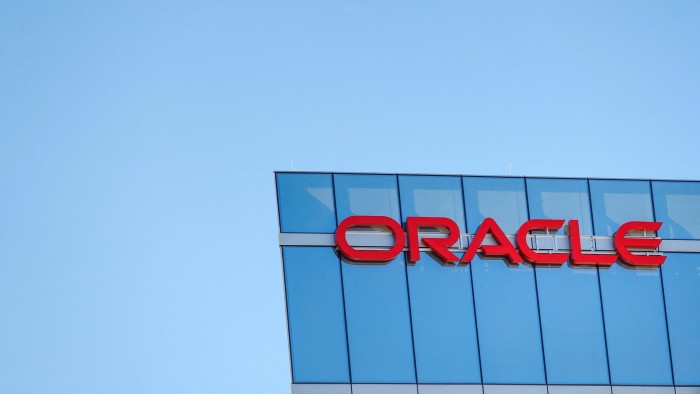Unlock the Editor’s Digest for free
Roula Khalaf, Editor of the FT, selects her favourite stories in this weekly newsletter.
Oracle reported a massive jump in bookings of future artificial intelligence business for its cloud infrastructure unit on Tuesday, propelling shares in the US database company up 27 per cent to a record high in after-hours trading.
The company’s remaining performance obligations — business it has booked that will feed through into future revenue — leapt to $455bn, up from only $138bn three months ago.
Safra Catz, chief executive, called it an “astonishing quarter” that had included Oracle signing “four multibillion-dollar contracts with three different customers” in the latest three months.
Wall Street had been primed for a leap in bookings following the disclosure of a new $30bn-a-year contract Oracle signed in July, but had not expected such a big rise in its book of future business.
The company, which was late to pivot its business into cloud computing services, has reaped the rewards of a groundswell in demand for data centre infrastructure from AI start-ups and other major technology groups. Earlier this year it signed a deal to partner with OpenAI and SoftBank on the $500bn Stargate project.
The after-hours surge in Oracle’s share price added about $170bn to its stock market value and boosted the personal wealth of founder Larry Ellison by roughly $70bn, cementing his position as the world’s second-richest person after Elon Musk. Oracle’s stock price had already gained 43 per cent since the start of the year.
On a call with investors, Catz said Oracle had signed “significant cloud contracts with a who’s who of AI, including OpenAI, xAI, Meta, Nvidia, AMD and many others”.
Revenue from its infrastructure business would jump from $18bn this year to $144bn in five years’ time, she predicted. The forecast is nearly 60 per cent higher than the $91bn that Wall Street had been expecting.
By comparison, revenue at Amazon Web Services, the biggest cloud company, topped $107bn in its last full year.
The jump in growth has left Wall Street analysts questioning how Oracle will be able to add computing capacity fast enough to handle the new demand, at a time when most cloud companies have complained of chip shortages.
Rival cloud computing companies Amazon, Microsoft and Alphabet, along with Meta, are on course to spend more than $350bn between them this year on data centres and other AI infrastructure and more than $400bn in 2026.
On Tuesday, Oracle lifted its capital spending forecast for its fiscal year to the end of next May by $10bn, to $35bn. Catz claimed the company was able to generate higher revenues with less capital spending than rivals because it does not invest in buildings and uses its computing equipment more efficiently. “I don’t want to call it asset-light . . . but it’s asset pretty light.”
Oracle has burst on to the scene as a significant player in the cloud market thanks to the heavy computing demands of training new AI models for a handful of customers.
Recommended
But Ellison said the surge in future demand reflected a shortage of computing to run AI models after they had been trained, known as inferencing. “People are running out of inferencing capacity,” he said on the call. “The inferencing market is much larger than the training market.”
For the latest quarter Oracle reported a 12 per cent gain in revenue, to $14.9bn, slightly below the $15bn Wall Street had been expecting. Adjusted net income rose 8 per cent to $4.3bn, higher than analysts’ expectations.
In July, it emerged OpenAI had agreed to lease 4.5 gigawatts of computing power from Oracle in a deal worth about $30bn a year. The move will entail Oracle developing multiple data centres across the US to satisfy the start-up’s computer-processing demands, having already reached a deal to supply a 1.2GW site in Abilene, Texas.


